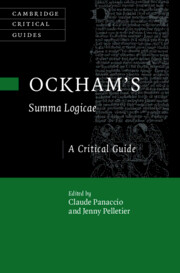Book contents
- Frontmatter
- Contents
- Contributors
- Abbreviations of Ockham’s Works
- Introduction
- Chapter 1 Metaphysical Methodology in Ockham’s Summa Logicae I
- Chapter 2 Ockham and Syncategoremata
- Chapter 3 Ockham on Metalanguage
- Chapter 4 Ockham’s Moderate Modism
- Chapter 5 Relations in Summa Logicae
- Chapter 6 The Threat of Pernicious Ambiguity
- Chapter 7 Ontology and Ockham’s Account of Truth Conditions for Tensed Propositions
- Chapter 8 Ockham’s Theory of the Categorical Syllogism
- Chapter 9 Ockham’s Modal Logic
- Chapter 10 Theory of Demonstration
- Chapter 11 The Obligationes of William of Ockham
- Chapter 12 Ockham on the Liar Paradox
- Chapter 13 Ockham on Figurative Discourse
- Bibliography
- Index
- Cambridge Critical Guides
Chapter 8 - Ockham’s Theory of the Categorical Syllogism
Published online by Cambridge University Press: 04 September 2025
- Frontmatter
- Contents
- Contributors
- Abbreviations of Ockham’s Works
- Introduction
- Chapter 1 Metaphysical Methodology in Ockham’s Summa Logicae I
- Chapter 2 Ockham and Syncategoremata
- Chapter 3 Ockham on Metalanguage
- Chapter 4 Ockham’s Moderate Modism
- Chapter 5 Relations in Summa Logicae
- Chapter 6 The Threat of Pernicious Ambiguity
- Chapter 7 Ontology and Ockham’s Account of Truth Conditions for Tensed Propositions
- Chapter 8 Ockham’s Theory of the Categorical Syllogism
- Chapter 9 Ockham’s Modal Logic
- Chapter 10 Theory of Demonstration
- Chapter 11 The Obligationes of William of Ockham
- Chapter 12 Ockham on the Liar Paradox
- Chapter 13 Ockham on Figurative Discourse
- Bibliography
- Index
- Cambridge Critical Guides
Summary
This chapter gives a critical exposition of Ockham’s innovations in the theory of the assertoric syllogism: his extensions of the class of syllogistic propositions to include singular propositions, propositions with a quantified predicate, tensed propositions and propositions in grammatical cases other than the nominative; his rules for the conversion of these propositions and for syllogisms containing them; his un-Aristotelian style of reducing syllogisms to the first figure by inference-to-inference transformations; and above all his use of supposition theory as a semantic base for this expanded syllogistic theory. His broadening of the scope of syllogistic theory resulted in abandoning several Aristotelian rules of the syllogism; it also resulted in a toleration of inferences containing redundant premises. The chapter provides proof-theoretic justifications for certain inferences that Ockham merely declared to be valid. It also argues that the originality of certain aspects of Ockham’s logic results from his philosophical nominalism.
Information
- Type
- Chapter
- Information
- Ockham’s Summa LogicaeA Critical Guide, pp. 169 - 188Publisher: Cambridge University PressPrint publication year: 2025
